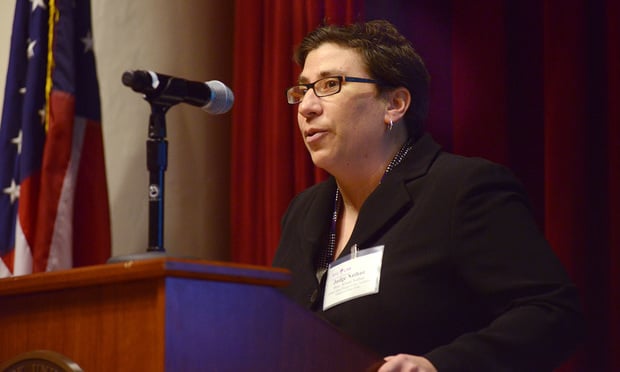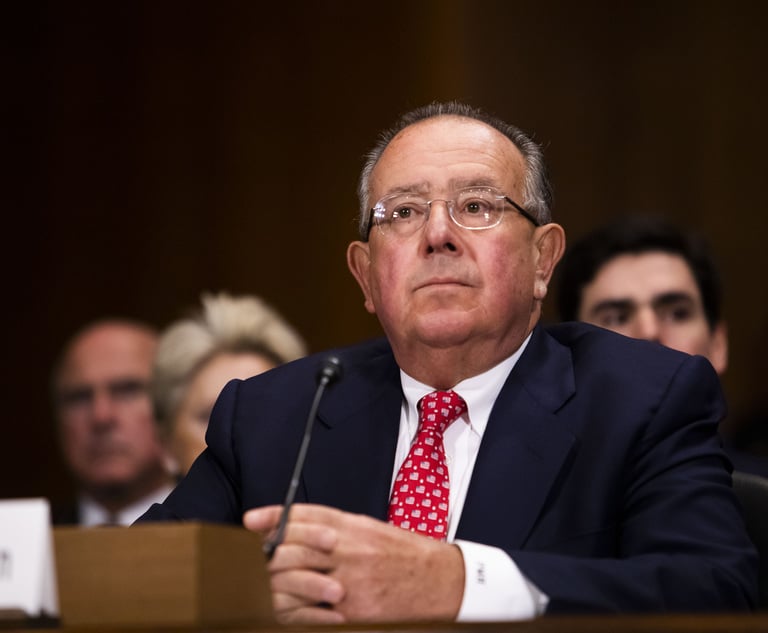Manhattan Federal Judge Orders Ex-NYPD Officer Released From Jail Over COVID-19 Concerns
U.S. District Judge Alison Nathan of the Southern District of New York, said courts had power to ability to grant compassionate release amid the COVID-19 pandemic, even if a prisoner had not exhausted administrative remedies.
April 20, 2020 at 04:01 PM
5 minute read
 U.S. District Judge Alison Nathan. Photo: Rick Kopstein/ALM
U.S. District Judge Alison Nathan. Photo: Rick Kopstein/ALM
A New York federal judge on Monday ordered the immediate release of a former New York City police officer from a federal prison in North Carolina, in a decision that decried the "Kafkaesque" approach officials had taken to quarantining inmates under their care.
The strongly worded ruling, from U.S. District Judge Alison Nathan of the Southern District of New York, said courts had power to ability to grant compassionate release amid the COVID-19 pandemic, even if a prisoner had not exhausted administrative remedies within the federal Bureau of Prisons, a hurdle that has doomed similar applications by inmates fearing for their health.
The 21-page opinion likewise lambasted the BOP over its "illogical and self-defeating" policy of quarantining prisoners for 14 days before their release, which in practice was "neither a quarantine nor limited to 14 days."
Instead, Nathan noted, people at FCI Butner, like other federal facilities across the country, were kept in close quarters with other inmates and prison staff, and no testing was administered prior to placement in a quarantine unit. If anyone were to test positive for the coronavirus, she said, the 14-day clock then starts anew.
"The court speaks in stark terms: this is an illogical and self-defeating policy that appears to be inconsistent with the directive of the attorney general, ungrounded in science, and a danger to both Mr. Scparta and the public health of the community," the opinion said.
Nathan's ruling came in the case of Gerard Scparta, a former NYPD officer who pleaded guilty last April to illegally collecting more than $630,000 in social security benefits and tax evasion. He is now serving an 18-month prison sentence at Butner, where to date at least 65 inmates and 25 staff members have tested positive for COVID-19, and five inmates have died, according to BOP statistics.
Nathan, however, noted that testing at BOP facilities has been "severely limited," and the true number of cases was "likely far higher" than the numbers officially reported.
Scparta, 55, who suffers from high blood pressure, sleep apnea and hypertension, filed an emergency motion for compassionate release April 8, arguing that his underlying health conditions exposed him to potentially deadly complications from COVID-19, should he contract the disease.
Though prosecutors initially opposed the request on exhaustion grounds, the BOP later deemed Scparta eligible to serve out the remainder of his sentence from his home in Orange County, New Jersey, following a mandatory two-week quarantine at the prison.
But Nathan said conditions at the prison trapped Scparta in a "bizarre limbo" of the BOP's quarantine policy, which "achieves the backward result of prolonging incarceration and increasing community spread." The "senselessness" of the approach, she said, was highlighted by the "undisputed scientific facts" that asymptomatic carriers of COVID-19 could still spread the disease and that those infected could spread the virus before they even appeared to be ill.
Applications for compassionate release amid the pandemic have sometimes been stymied by a provision of the First Step Act, which requires federal judges to consider the motions after defendants have exhausted their rights to petition that that the BOP move for release on an inmate's behalf or until 30 have past since a warden received the request.
Judges in the Southern District have split over the question of whether the exhaustion requirement can be waived, but Nathan ruled that there were equitable exceptions to the statute when inmates faced a particularly high risk to their health.
"For Mr. Scparta to wait an additional two weeks (until 30 days lapse under the First Step Act's exhaustion requirement) could be the difference between life and death—and if he falls seriously ill or dies, he would have suffered irreparable harm and his motion seeking release would be futile," she wrote.
Scparta's attorney, Joseph Mure Jr., said he was "pleased" with Judge Nathan's ruling and hoped the case would lead to other inmates being released.
"It's easy to forget and lose sight of prisoners' rights during a pandemic," Mure said in a statement. "FCI Butner is largely infected with COVID-19 and the methods they are using to try to quarantine individuals are unsafe, dangerous and perilous. People are getting sick every day, and unless something is done they are endangering people's lives."
A spokesman for the Manhattan U.S. Attorney's Office declined to comment on the ruling.
Read More:
Ex-Senate Leader Dean Skelos Expected to Be Released From Prison After Positive Test for COVID-19
'Powerless': NY Federal Judge Calls for Congress to Act to Protect Inmates From COVID-19
This content has been archived. It is available through our partners, LexisNexis® and Bloomberg Law.
To view this content, please continue to their sites.
Not a Lexis Subscriber?
Subscribe Now
Not a Bloomberg Law Subscriber?
Subscribe Now
NOT FOR REPRINT
© 2025 ALM Global, LLC, All Rights Reserved. Request academic re-use from www.copyright.com. All other uses, submit a request to [email protected]. For more information visit Asset & Logo Licensing.
You Might Like
View All
Decision of the Day: Judge Rules Brutality Claims Against Hudson Valley Police Officer to Proceed to Trial

Skadden and Steptoe, Defending Amex GBT, Blasts Biden DOJ's Antitrust Lawsuit Over Merger Proposal
4 minute read
Read the Document: DOJ Releases Ex-Special Counsel's Report Explaining Trump Prosecutions
3 minute read
Trending Stories
- 1Critical Mass With Law.com’s Amanda Bronstad: LA Judge Orders Edison to Preserve Wildfire Evidence, Is Kline & Specter Fight With Thomas Bosworth Finally Over?
- 2What Businesses Need to Know About Anticipated FTC Leadership Changes
- 3Federal Court Considers Blurry Lines Between Artist's Consultant and Business Manager
- 4US Judge Cannon Blocks DOJ From Releasing Final Report in Trump Documents Probe
- 5White & Case KOs Claims Against Voltage Inc. in Solar Companies' Trade Dispute
Who Got The Work
J. Brugh Lower of Gibbons has entered an appearance for industrial equipment supplier Devco Corporation in a pending trademark infringement lawsuit. The suit, accusing the defendant of selling knock-off Graco products, was filed Dec. 18 in New Jersey District Court by Rivkin Radler on behalf of Graco Inc. and Graco Minnesota. The case, assigned to U.S. District Judge Zahid N. Quraishi, is 3:24-cv-11294, Graco Inc. et al v. Devco Corporation.
Who Got The Work
Rebecca Maller-Stein and Kent A. Yalowitz of Arnold & Porter Kaye Scholer have entered their appearances for Hanaco Venture Capital and its executives, Lior Prosor and David Frankel, in a pending securities lawsuit. The action, filed on Dec. 24 in New York Southern District Court by Zell, Aron & Co. on behalf of Goldeneye Advisors, accuses the defendants of negligently and fraudulently managing the plaintiff's $1 million investment. The case, assigned to U.S. District Judge Vernon S. Broderick, is 1:24-cv-09918, Goldeneye Advisors, LLC v. Hanaco Venture Capital, Ltd. et al.
Who Got The Work
Attorneys from A&O Shearman has stepped in as defense counsel for Toronto-Dominion Bank and other defendants in a pending securities class action. The suit, filed Dec. 11 in New York Southern District Court by Bleichmar Fonti & Auld, accuses the defendants of concealing the bank's 'pervasive' deficiencies in regards to its compliance with the Bank Secrecy Act and the quality of its anti-money laundering controls. The case, assigned to U.S. District Judge Arun Subramanian, is 1:24-cv-09445, Gonzalez v. The Toronto-Dominion Bank et al.
Who Got The Work
Crown Castle International, a Pennsylvania company providing shared communications infrastructure, has turned to Luke D. Wolf of Gordon Rees Scully Mansukhani to fend off a pending breach-of-contract lawsuit. The court action, filed Nov. 25 in Michigan Eastern District Court by Hooper Hathaway PC on behalf of The Town Residences LLC, accuses Crown Castle of failing to transfer approximately $30,000 in utility payments from T-Mobile in breach of a roof-top lease and assignment agreement. The case, assigned to U.S. District Judge Susan K. Declercq, is 2:24-cv-13131, The Town Residences LLC v. T-Mobile US, Inc. et al.
Who Got The Work
Wilfred P. Coronato and Daniel M. Schwartz of McCarter & English have stepped in as defense counsel to Electrolux Home Products Inc. in a pending product liability lawsuit. The court action, filed Nov. 26 in New York Eastern District Court by Poulos Lopiccolo PC and Nagel Rice LLP on behalf of David Stern, alleges that the defendant's refrigerators’ drawers and shelving repeatedly break and fall apart within months after purchase. The case, assigned to U.S. District Judge Joan M. Azrack, is 2:24-cv-08204, Stern v. Electrolux Home Products, Inc.
Featured Firms
Law Offices of Gary Martin Hays & Associates, P.C.
(470) 294-1674
Law Offices of Mark E. Salomone
(857) 444-6468
Smith & Hassler
(713) 739-1250






